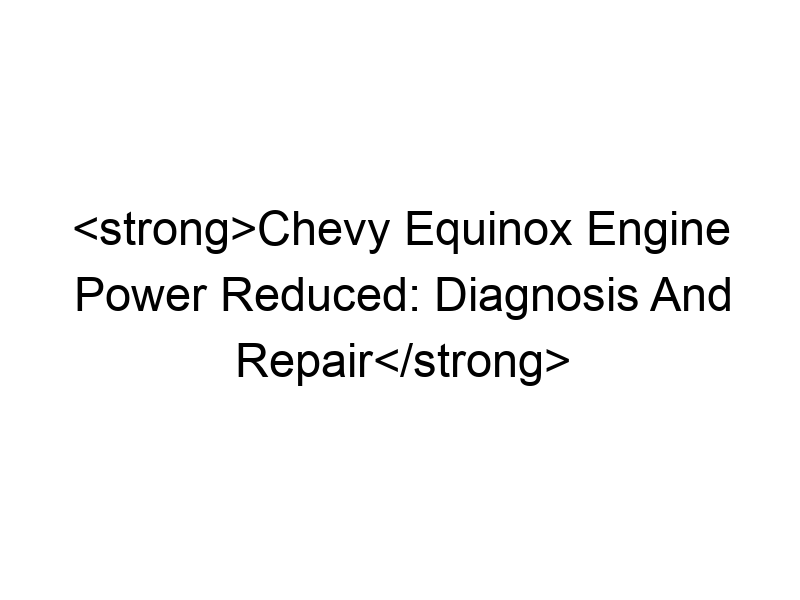A frustrating experience for any Chevy Equinox owner is the sudden appearance of the “Engine Power Reduced” warning light. This often leads to a significant decrease in vehicle performance, making driving difficult and potentially dangerous. This comprehensive guide will walk you through understanding the causes of this issue, diagnosing the problem, and exploring potential solutions for restoring your Equinox’s power. We will cover everything from simple checks you can perform yourself to more complex repairs best left to a professional mechanic.
The “Engine Power Reduced” message on your Chevy Equinox’s dashboard indicates that the engine’s computer (PCM or Powertrain Control Module) has detected a problem that could damage the engine if full power is maintained. This is a safety feature designed to prevent further damage. It’s crucial to understand that this isn’t simply a
minor inconvenience; it signals a potential issue that needs attention.
Why it Matters
Ignoring this warning light could lead to more extensive and costly repairs down the line. Driving with reduced engine power can also impact your safety, especially during acceleration or merging onto highways. Early detection and diagnosis are key to preventing major engine damage.
Common Causes of Reduced Engine Power in a Chevy Equinox
Several factors can trigger the “Engine Power Reduced” warning. These range from relatively minor issues to more serious engine problems. A systematic approach to diagnosis is crucial.
Throttle Position Sensor (TPS) Issues
The TPS monitors the throttle plate’s position and sends this data to the PCM. A faulty TPS can provide inaccurate information, leading to reduced engine power. A simple diagnostic check using an OBD-II scanner can often identify TPS malfunctions.
Mass Airflow Sensor (MAF) Problems
The MAF sensor measures the amount of air entering the engine. A dirty or malfunctioning MAF sensor can provide incorrect readings to the PCM, resulting in a lean fuel mixture and reduced power. Cleaning the MAF sensor (carefully, using MAF sensor cleaner) can often resolve the issue.
Spark Plug and Ignition Coil Problems
Worn-out spark plugs or faulty ignition coils can prevent proper combustion, leading to decreased engine power. Replacing these components is often a straightforward repair.
Catalytic Converter Issues
A clogged catalytic converter restricts exhaust flow, causing backpressure that reduces engine performance. A clogged converter needs professional replacement.
Oxygen Sensor Malfunctions
Oxygen sensors monitor the exhaust gases to help the PCM adjust the air-fuel mixture. A faulty oxygen sensor can lead to an incorrect fuel mixture, affecting engine power.
Problems with the PCV Valve
The PCV (Positive Crankcase Ventilation) valve helps to regulate crankcase pressure. A faulty PCV valve can cause excessive pressure build-up, affecting engine performance.
Diagnosing the Problem: DIY vs. Professional Help
Before attempting any repairs, it’s essential to understand your mechanical capabilities. Simple checks like inspecting the spark plugs and cleaning the MAF sensor are suitable for DIY enthusiasts. However, more complex issues like catalytic converter problems require professional help.
Using an OBD-II Scanner
An OBD-II scanner can retrieve diagnostic trouble codes (DTCs) from the PCM. These codes provide clues about the potential cause of the problem. Many affordable OBD-II scanners are available online.
Step-by-Step Troubleshooting Guide
This section provides a structured approach to troubleshooting the “Engine Power Reduced” issue, starting with the simplest checks and progressing to more involved diagnostics.
Step 1: Check the Obvious
Begin by checking for any visible damage to the engine bay, including loose connections, frayed wires, or any obvious leaks.
Step 2: Inspect the Spark Plugs
Inspect the spark plugs for wear and tear, fouling, or damage. Replace them if necessary.
Step 3: Clean the Mass Airflow Sensor
Gently clean the MAF sensor using a specialized MAF sensor cleaner. Ensure you follow the manufacturer’s instructions carefully.
Step 4: Check the Throttle Position Sensor
Use an OBD-II scanner to check the TPS voltage readings. If the readings are outside the specified range, the TPS may need replacement.
Advanced Diagnostics and Repairs
If the basic troubleshooting steps don’t resolve the problem, you’ll likely need more advanced diagnostic tools or professional help.
Professional Diagnosis and Repair
A qualified mechanic has access to specialized tools and diagnostic equipment that can pinpoint the exact cause of the problem. They can also perform more complex repairs.
Preventive Maintenance for Long-Term Reliability
Regular maintenance can significantly reduce the risk of encountering “Engine Power Reduced” issues.
Regular Servicing
Adhering to the recommended maintenance schedule in your Chevy Equinox’s owner’s manual is crucial. This includes regular oil changes, filter replacements, and inspections.
Cost Considerations for Repairs
The cost of repairing the “Engine Power Reduced” issue varies greatly depending on the cause.
Cost Range for Different Repairs
Minor issues like replacing spark plugs or cleaning the MAF sensor are relatively inexpensive. More significant problems like catalytic converter replacement can be considerably more costly.
Alternatives to Dealership Repairs
While dealerships offer expertise, they often come with higher prices. Exploring alternative repair shops can be a cost-effective option.
Independent Mechanics and Repair Shops
Independent mechanics can often provide quality repairs at a lower cost than dealerships.
The Role of the Powertrain Control Module (PCM)
The PCM is the engine’s “brain,” controlling various aspects of engine operation. Problems with the PCM itself are less common but can cause “Engine Power Reduced” warnings.
PCM Diagnostics and Replacement
Diagnosing and repairing PCM issues requires specialized tools and expertise.
Understanding Your Chevy Equinox’s Warranty
Your vehicle’s warranty might cover some repairs related to the “Engine Power Reduced” problem.
Warranty Coverage and Limitations
It’s essential to understand the terms and conditions of your warranty. Some issues may be covered, while others might not be.
Frequently Asked Questions
What are the most common causes of “Engine Power Reduced” in a Chevy Equinox?
The most common causes include issues with the Mass Airflow Sensor (MAF), Throttle Position Sensor (TPS), spark plugs, and ignition coils. A clogged catalytic converter can also trigger this warning.
Can I drive my Chevy Equinox with the “Engine Power Reduced” light on?
While you can drive it short distances, prolonged driving with this light on is not recommended. Reduced power can impair handling and increase the risk of engine damage.
How much does it typically cost to fix “Engine Power Reduced” on a Chevy Equinox?
The cost depends heavily on the underlying problem. Simple fixes like replacing spark plugs might cost less than $100, while replacing a catalytic converter could cost upwards of $1000.
What is the role of an OBD-II scanner in diagnosing engine problems?
An OBD-II scanner reads diagnostic trouble codes (DTCs) from the vehicle’s computer. These codes pinpoint potential issues, guiding repair efforts. It’s a great first step in diagnosing engine troubles.
Should I always go to a dealership for repairs?
Not necessarily. Independent mechanics often offer comparable quality repairs at a lower price. However, always choose a reputable mechanic with positive reviews.
Final Thoughts
Experiencing the “Engine Power Reduced” warning light on your Chevy Equinox can be alarming, but it’s a crucial safety feature designed to protect your engine from further damage. By systematically following the troubleshooting steps outlined above, you can work towards identifying and resolving the issue. Whether you choose DIY repair or seek professional help, remember that prompt attention is key. Don’t hesitate to consult a trusted mechanic if you’re uncertain about any of the diagnostic or repair steps. Regular maintenance is crucial for preventing future issues and ensuring your Chevy Equinox’s longevity. Remember, addressing this problem promptly can save you money and maintain the safety and reliability of your vehicle.

